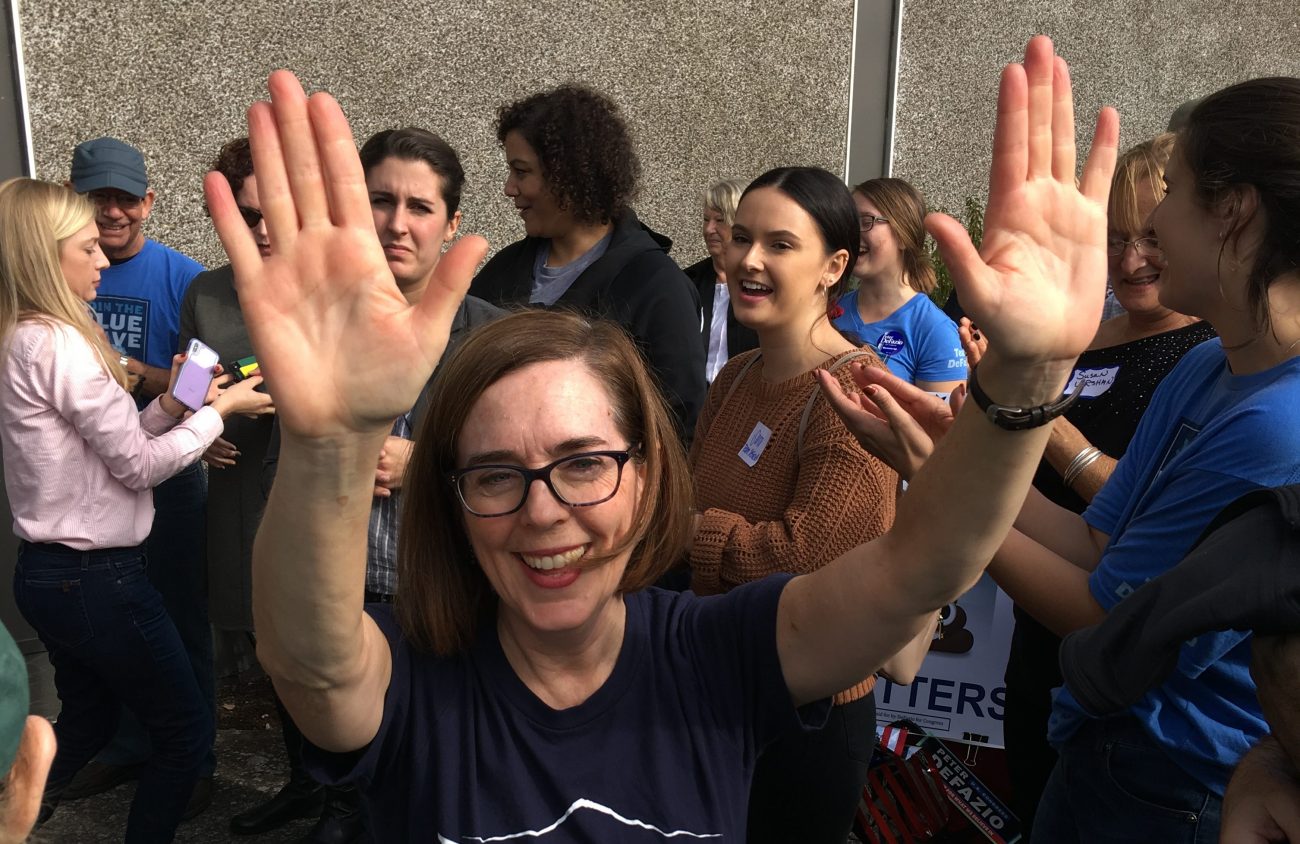Gov. Kate Brown stood atop a bench, pumping her fist. She wanted to remind the Democratic Party of Lane County’s volunteers that this election is an important one for reproductive rights, the environment, immigration and other issues that Oregon has made progress on.
With less than two weeks left in the 2018 Oregon gubernatorial race, Brown said her challenger, Knute Buehler, wants to undo this progress. She said he hasn’t been a transparent candidate or serious about campaign finance reform and the fact that he’s willing to collaborate with President Donald Trump should be a red flag of what kind of governor he would be.
During Brown’s speech, she said Buehler would move Oregon away from being a state that resists President Donald Trump and his policies — and that Buehler supports Measure 105.
Buehler’s campaign previously confirmed that he supports the measure but won’t associate with the organization that led the petition process, Oregonians for Immigration Reform, a hate group according to the Southern Poverty Law Center.
Brown reminded volunteers, who were about to go out into the community to “Get Out The Vote,” that she was the only candidate who opposed Measure 105, the ballot measure that would end a 30-year-old law prohibiting local and state law enforcement from enforcing federal immigration law.
Brown focused her speech mostly on her own race and Labor Commissioner-elect Val Hoyle said Lane County is the key to whether or not Brown wins. The gubernatorial race is getting close, according to the most recent poll. And this week hasn’t been too kind to Oregon’s governor.
After a week of news outlets covering Brown’s Education Innovation Officer Colt Gill’s decision to delay reports on Oregon’s schools until after the election, as well as the governor’s office preventing the agenda for next year’s legislative session from being announced, Brown assures she is still dedicated to transparency.
Gill was previously superintendent of Bethel school district here in Lane County.
“I will take a back seat to no one on my work around transparency,” she told Eugene Weekly. “When Kitzhaber left office, there were hundreds of thousands of records that were being requested that hadn’t been responded to. We immediately cleaned up those past requests and as of two weeks ago, we have no public records request pending in my office.”
She went on to add that she worked with Attorney General Ellen Rosenblum and state Rep. John Huffman to create the public records advocate and Oregon Sunshine Committee, “creating frankly the most extensive reforms around transparency since 1973, and I’m really proud of that work,” she said. “I think there’s more work to do, but I’m really pleased with what we’ve done so far.”
Brown added that if Oregonians are concerned about transparency, Buehler won’t be committed to it if elected.
“He has not released his tax records,” she said. “I know the Democratic Party of Oregon made a public records request. It was one records request. Took his office six months to respond to that records request.”
She added: “I would just say that six months is a really long time to respond to one records request.”
DPO’s long response and high cost for several public records requests to Buehler’s legislative office resulted in the creation of a website that lists the requested records.
This governor race has been filled with contributions. Although Brown has received her share of money from organizations such as $500,000 from EMILY’s List, $1 million from Democratic Governors Association and $500,000 from Michael Bloomberg, it pales in comparison to Buehler’s.
So far, Phil Knight, Nike co-founder and chairman emeritus, has donated $2.5 million to Buehler. He’s also given $1 million to the Republican Governors Association — which has donated $2 million to Buehler.
Brown, wearing a Nike hoodie, tells EW that she’s interested in working with Oregonians for putting forth campaign finance contribution limits. This would require a constitutional amendment, so it would have to be put on a ballot.
Brown said Buehler advocated for supporting limits on contributions, but once he was in office, he declined to work with her and in this race has gone on to accept financial support from the unknown Priority Oregon political action committee.
Her other opponent, Independent candidate Patrick Starnes, has told EW that his number one priority would be campaign finance reform to get public interest out of Salem. Brown says she would definitely collaborate with Starnes if he came to her.
Although campaign finance reform is a high priority for her, she joked that she’s been busy with back-to-back campaigning for the governor’s office to take a shot at her by herself.
Brown was joined by the Democratic Party of Oregon chair and former Secretary of State Jeanne Atkins, Rep. Peter DeFazio, state Sen. James Manning, Hoyle and state Rep. Floyd Prozanski at the event.
